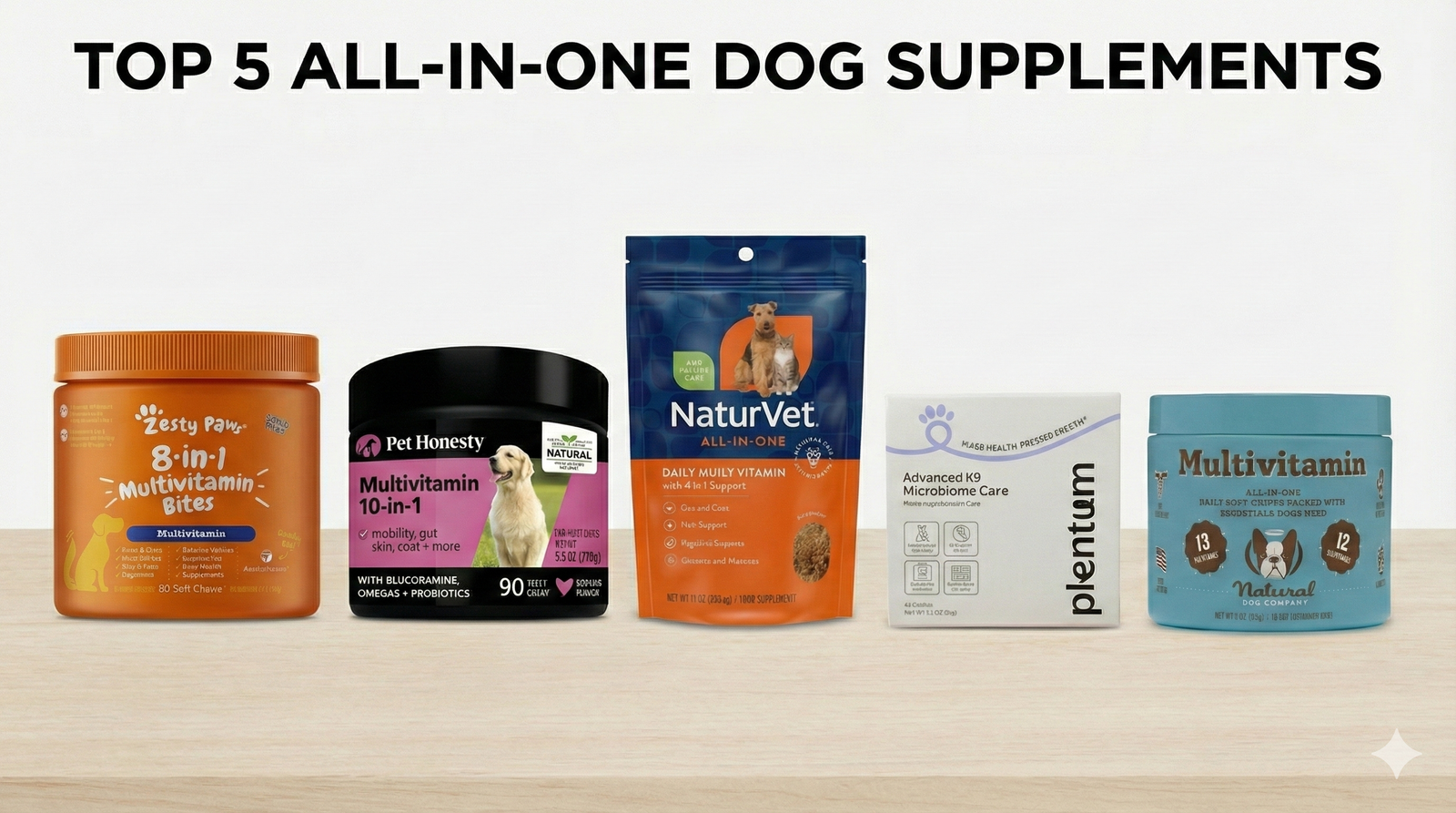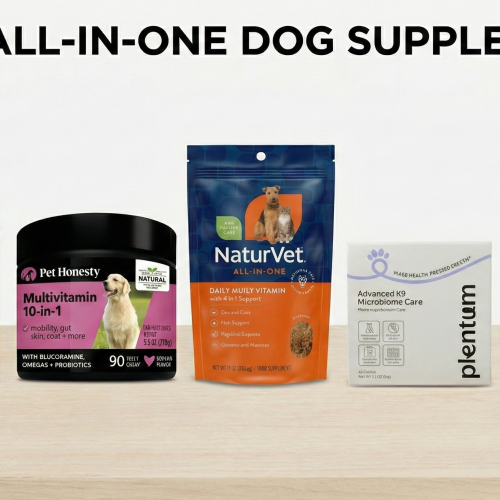Key Takeaways You’ve done the research, read the reviews, and invested in a high-quality supplement to support your dog’s gut health. But there is one critical step that often gets overlooked: dog probiotic storage. Unlike standard vitamins, probiotics are living organisms (or dormant ones waiting to wake up). If they aren’t stored correctly, they can die long before they reach your dog’s bowl. A “dead” probiotic is essentially just expensive protein powder; it won’t cause harm, but it won’t provide the benefits you paid for. Whether you are using a daily powder, a soft chew, or a specialized paste, understanding the science of storage is the key to ensuring your investment yields results. Do Dog Probiotics Need to Be Refrigerated? This is the most common question pet parents ask, and the answer lies in the biology of the bacteria. The Shelf Stable vs. Refrigerated Dog Probiotics Difference Not all bacterial strains are created equal. However, “shelf-stable” doesn’t mean “invincible.” It simply means the product can survive at controlled room temperatures (usually defined as 68°F–77°F). If your home gets hotter than this during the summer, even shelf-stable products belong in the fridge. Dog Probiotic Storage Temperature Guidelines Temperature is the primary driver of bacterial degradation. The general rule is simple: cooler is always better. Does Heat Kill Dog Probiotics in Shipping? Yes, it can. The “last mile” of delivery is often where damage occurs. A delivery truck in July can easily exceed 120°F, turning a bottle of supplements into a bacterial graveyard. Smart Tip: Try to stock up on supplements during cooler months or choose brands that use spore-forming strains (Bacillus coagulans or Bacillus subtilis), which are naturally resistant to thermal stress. If you must order sensitive Lactobacillus products in summer, ensure the retailer uses expedited shipping with cold packs. Best Way to Store Dog Probiotic Chews Soft chews present a unique challenge because they contain moisture to keep them soft. This moisture can be a breeding ground for spoilage if handled poorly. Traveling with Dog Probiotics Tips Maintaining your dog’s gut health routine is crucial during travel, as stress often triggers digestive upset. How to Tell if Dog Probiotics Are Dead Since you can’t see microscopic bacteria, how do you know if your product is still working? Sensory Clues: Clinical Clues: The most accurate test is your dog’s response. If a product that previously supported your dog’s stool quality or skin health suddenly stops working, do not assume your dog has built a tolerance. Assume the bottle has lost potency. Conclusion: Perform a Pantry Audit Storage isn’t just about keeping things tidy; it’s about preserving biological activity. Take a moment today to check your dog’s supplements. Are they sitting near the oven? Is the lid loose? Are they past their expiration date? By moving sensitive products to the fridge and keeping shelf-stable ones in a truly cool, dark place, you ensure that every scoop or chew delivers the support your dog needs to maintain a happy, healthy life. Frequently Asked Questions 1. Can I store shelf-stable probiotics in the refrigerator? Yes, absolutely. Refrigeration slows down molecular activity, which preserves bacterial viability. It is the safest way to extend the shelf life of almost any probiotic supplement. 2. Does freezing kill dog probiotics? Generally, no. Freezing puts bacteria into a dormant state rather than killing them. However, repeated thawing and refreezing can introduce moisture, which is harmful. 3. How long do probiotics last after opening? Most manufacturers recommend using the product within 3 to 6 months after opening. Always check the label for “use by” dates to ensure maximum potency. 4. My probiotic powder turned hard; is it safe? Hard clumps indicate moisture exposure. While likely not toxic, the bacteria have probably activated and died, meaning the product will no longer be effective. 5. Can I mix probiotics into food in advance? No. Once probiotics touch moist food, they activate. If left sitting in the bowl for hours, they may lose potency. Add them immediately before feeding.
How Seasonal Shifts Impact Your Dog’s Gut Health and Daily Care
Key Takeaways Some people with pets follow a pattern: same food, same stroll, same snacks every single month. Yet could it strike you how your pup suddenly gets runny poop when seasons shift? Or maybe they pack on pounds during cold months without reason. Perhaps none of that is random after all. Science now shows how deeply the dog’s body responds to nature’s pace shifts when weather and time shift too. When spring arrives, your dog’s inner system adjusts just like fur sheds for changing winds. The real challenge isn’t rare risks, it’s overlooked patterns in nature’s rhythm. Think of autumn leaves: they fall to make room for growth, so too does the gut reset each season. Winter cold doesn’t freeze everything, it balances hormones under snow. Each turn of the year reshapes what food, medicine, or rest your animal needs most. Paying attention isn’t about fear, it’s tuning into quiet signals that health depends on invisible cycles. Why Does Weather Affect My Dog’s Digestion? An odd thing is that the thermometer can shift your dog’s gut microbes. Scientists call this shift “temperature-induced microbiome plasticity.” Bacteria levels in the gut adapt in response, adjusting how your pet handles heat and power. Back then, this kept animals safe. These days in household animals, such changes might confuse their body systems. If we fail to adapt their care as those rhythms evolve, balance can slip causing restless skin, low energy, or digestive issues we tend to label as unexpected missteps. Spring: The Season of Inflammation and Leaky Gut When spring arrives, pet digestion can get harder than during other times. With greenery popping up everywhere, animals face invisible threats floating pollen particles fill the air. While sniffles may catch your eye first, silent struggles take place deep within the body. Dogs might swallow pollen after licking paws. That contact sets off a response in the gut lining, releasing histamine. As a result, the inner skin of the intestines swells slightly. Permeability goes up under these conditions scientists sometimes label it “leaky gut.” Once barriers break down, harmful substances slip through. They move into blood circulation nearby. Bodywide swelling may follow without delay. Daily Care Strategy: One way around it? Try a gut immunity booster. Certain probiotics, say Bifidobacterium animalis, might reduce allergic reactions when season starts high. Nettle or berries with quercetin may block histamine from breaking through the gut wall. Summer: Heat Stress and the “Cooling” Diet Heat in summer quietly harms the gut. As your pup breathes fast to stay cool, circulation shifts and less fluid reaches the tummy. Without enough supply, that area becomes vulnerable. Weakness shows up as loose stools or sickness after high-energy moments. Dogs tend to swallow lots of water after eating, which weakens their stomach acid. Because of this, harmful bacteria such as Salmonella often in discarded meals can survive more easily inside their bodies. Daily Care Strategy: Move toward a “cooling” diet. During summer, according to Traditional Chinese Medicine, people should eat cooling foods such as duck or whitefish instead of heat-producing options like lamb. Staying well-hydrated matters most now, yet drinking freezing water directly might irritate the stomach. Still, try electrolyte-packed bone broth or wet treats such as sliced cucumber to keep cells well-hydrated. Autumn: The Metabolic Molt and Fiber Needs When daylight grows shorter, a shift begins inside your furry companion. Metabolism kicks into gear during autumn, like fuel pouring into a slow burner. Instead of storing fat, the animal starts weaving together layers for colder months. Underneath the current coat, new growth stirs thicker, deeper, built for cold years ahead. This transformation runs on protein, not wishes or seasonal changes alone. The body taps into reserves, converting them into fabric for coming winters. Not magic, just physics dressed in fur. When food choices fall short, nature finds another way. Nutrients can slip away from gut protection toward faster parts, leaving someone feeling off base. Daily Care Strategy: Now comes the time for pumpkins to show their natural gift. Inside plain pumpkin puree, there lives a quiet helper soluble fiber that gently supports gut balance during the shift in seasons, a key part of seasonal gut care. Rather than rushing to fix problems, it works ahead by nourishing good bacteria, strengthening their presence so they can endure cold months ahead. Besides that, it lifts the back part of the stool too. That section acts like a valve, keeping things steady inside the dog’s system. During cooler seasons, some pets struggle more with discharge from deeper gland areas. Support there makes release less likely to cause discomfort. Winter: Combatting Stagnation with Winter Gut Care Frost sets in when days grow short. Heavy air hangs still, nipping outdoor rhythm, pulling routines closer to the sofa. Less stride means slower digestion movement fades before the gut catches up. Stale flow turns meals into heaviness, quietly piling pounds by January. Some think furry friends need extra food when it’s cold so they stay warm. Yet for dogs inside most of the time, less might be better. Eating too much through these quiet months tips the balance into inflammation. That shift scratches the natural ecosystem living in their gut. Daily Care Strategy: When it is cold outside, how we care for the gut matters more for winter gut care. Change to warming foods such as chicken or venison to help digestion feel alive. Serve meals at a gentle warmth instead of hot or cold. Because dogs cannot run around much, bring in puzzle toys inside to spark connection between digestive system and mind. Get them active while eating by making eating itself part of the effort. How Do I Start a Seasonal Care Routine? Life changes aren’t required to help your dog handle yearly routines. Begin by focusing on three key parts of everyday attention: Seeing change ahead means reacting before problems grow. A dog’s digestive system drives their daily function when seasons shift, adjustments here impact overall health throughout the year. Frequently Asked Questions Q:
Probiotic Overdose in Dogs: Early Warning Signs Every Parent Should Know
Key Takeaways Everyone knows the moment. A fresh jar of supplements sits untouched until now. Two seconds gone, and the animal has beaten you to it. Floor covered in crumbs, shell cracked open without warning. If that scene plays out where you sit, dog eyes meeting your gaze, silence heavy with knowing, simply pause right here. Something else crosses your thoughts “Could too many probiotics be bad for my dog?” Here’s the truth: most of the time, it’s not deadly, though outcomes hinge on what’s actually inside that bite. Even though probiotics tend to be safe good bacteria, extra ingredients in pills might quietly threaten health. Step by step, this piece shows how to respond when your pet eats one, which warning signs matter, then ways to support healing afterward. Step 1: The “Label Audit” (Do This First) First, check for poisons. Bacteria like Lactobacillus might not cause harm even in large amounts. Still, some gums or suckers hold additives, flavors, preservatives that could be risky if swallowed in big chunks. So it is better to look closely at what is really inside rather than focusing only on germs. Pick up the bottle then take a look at what’s written inside watch out for these signs right away: Pure probiotics mean bacteria plus fiber that’s mostly safe. Most likely it’s just bad digestion hitting your gut hard. No need to worry about germs; this feels more like a food overload sitting wrong. Recognizing the Symptoms: Digestion vs. Emergency After eating vast numbers of added bacteria, a dog’s body struggles to keep up. Called dysbiosis, this short-term disruption happens when beneficial microbes overpopulate the digestive area. They break down meals rapidly, which pulls fluid into the gut spaces. The “Wait and See” Symptoms (Digestive Distress) These feel awkward yet often clear up on their own with basic care at home: The “Go to the Vet” Symptoms (Emergency) Look out these signs point to poisoning, probably from Xylitol or something else in the mix, not just bad bacteria building up: The Science: Why “Too Much Good” Is Bad Even good supplements sometimes lead to sickness. Fermentation plays a key role here. Bacteria within probiotics thrive on fiber more than most things. A sudden flood of bacteria and fiber, say, inulin hits the gut head-on. Right then, those microbes explode into action. Gas builds up fast when fermentation kicks into high gear. Metabolism kicks out extra stuff too. Think of the dog’s gut like roads clogged with too many cars. The system responds by pushing the mess out that’s why stool gets loose and sloppy. The Road to Recovery: Bland Diets and Hydration When your dog seems awake, cheerful, yet dealing with mild gas or soft poop, handling it yourself might help. Letting the digestive system take a break so it can recalibrate is what matters most. 1. The 12-Hour Fast Skip the next scheduled meal. This stops adding fuel to the fermentation fire. (Note: Do not fast puppies or diabetic dogs without vet approval). 2. Hydration is Key Dogs lose water fast when they have diarrhea. Give them sips just a little at a time spread out across minutes. Ice flakes work too, dropped often into their mouth. 3. The “Reset” Menu Start feeding real food again, but skip the usual kibble you normally give. Choose items that digest well and contain minimal fat. Now happens to be a great moment to prepare simple easy dog treats or homemade meals for your pet: During recovery, skip every fancy packaged treat you find. Tiny pieces of cooked sweet potato boiled and soft worked better than most options. These sensitive stomach treats or plain rice balls help too, quietly supporting digestion. These choices give gut friendly snacks strength without wearing down the gut. Future-Proofing: A Safer Approach Mishaps occur, yet here lies a chance to reassess how your dog handles gut wellness. Studies now point toward Postbiotics non-living, consistent derivatives from bacteria instead of active microbes. Since postbiotics lack vitality, they’re less likely to spark extreme fermentation, unlike excessive live probiotics. Frequently Asked Questions 1. Can a probiotic overdose kill a dog? Most harm comes from hidden additives like Xylitol, not bacteria. These can cause serious illness fast, so check ingredients carefully even if they seem harmless. 2. How long do overdose symptoms last? Gut issues like gas or loose stool typically appear within a day. With proper home care, most symptoms resolve completely within two to four days. 3. Should I induce vomiting if my dog eats probiotics? Vomiting should not be triggered unless a veterinarian gives clearance. Chews might turn dangerous if swallowed and then re-emerged, possibly irritating the esophagus or throat. 4. What home remedy stops dog diarrhea fast? Bland food works better. Try boiled chicken mixed with white rice, or slip some plain canned pumpkin into meals to calm the digestive system quickly. 5. Are postbiotics safer than probiotics for dogs? Yes. Since postbiotics are non-living, they deliver immune support without the risk of bacterial overgrowth, significantly reducing common side effects like excessive gas or bloating.
Senior Dog Gut Health Made Stronger with the Right Probiotic Care
Key Takeaways Seeing your dog’s muzzle turn gray is a bittersweet milestone. While their spirit remains forever young, their bodies undergo silent changes that require a new approach to wellness. You might notice they are sleeping more, moving slower, or having occasional tummy troubles that never bothered them before. These aren’t just random signs of aging; they are often clues pointing to the gut. As veterinary science advances, we now understand that a senior dog’s vitality is deeply rooted in their microbiome. Moving beyond basic nutrition to functional senior gut support can help “turn back the clock” on their internal health, offering them comfort and resilience in their golden years. Why does my senior dog’s gut health change? It is not just your imagination, your older dog’s digestion truly is different now. Research indicates that aging dogs experience a phenomenon called “immunosenescence,” which is the gradual deterioration of the immune system. Since approximately 70% to 90% of a dog’s immune system resides in the gut, this decline hits their digestive tract hard. This process often leads to a state known as “inflammaging”, a chronic, low-grade inflammation that simmers throughout the body. In the gut, this manifests as a breakdown in the barrier function, often called “leaky gut.” The tight junctions between intestinal cells loosen, allowing bacterial toxins to leak into the bloodstream. This doesn’t just cause gas or loose stool; it contributes to systemic issues like joint stiffness and lethargy. Furthermore, studies show a specific “aging signature” in the microbiome. Beneficial bacteria like Lactobacillus and Bifidobacterium naturally deplete as dogs age, while opportunistic populations like E. coli tend to rise. This imbalance makes probiotics for senior dogs an essential tool, not just a luxury. Can probiotics help with my older dog’s anxiety or confusion? Surprisingly, yes. One of the most profound connections in your dog’s body is the Gut-Brain Axis, a communication highway linking their intestines to their emotional centers. If you have noticed your senior dog pacing, panting, or seeming “lost” (signs of Canine Cognitive Dysfunction), their gut bacteria might be part of the solution. Specific strains are the secret here. Bifidobacterium longum (specifically strain BL999) acts as a “psychobiotic.” Clinical studies have demonstrated that this strain can help reduce anxious behaviors like barking and spinning by communicating with the central nervous system via the vagus nerve. By restoring these crucial “calming” bacteria, a probiotic for older dogs can help soothe their mind, proving that gut health affects far more than just digestion. What are the best probiotic strains for senior dogs? Not all supplements are created equal, and a generic formula might not touch the specific needs of a geriatric system. When reading labels for senior gut support, look for these science-backed powerhouses: How long does it take to see results in senior dogs? Patience is key when working with an older microbiome. Unlike a young pup who might bounce back instantly, a senior gut takes time to repair. While you might see improvements in stool consistency within a few days (especially with strains like Enterococcus faecium), systemic benefits take longer. Repairing the “leaky gut” barrier and modulating the immune response typically requires 4 to 6 weeks of consistent use. For behavioral changes related to the Gut-Brain Axis, allow up to six weeks for the neuroactive compounds to reach therapeutic levels. Consistency is your best friend here; missing doses can allow the “old,” rigid microbiome to re-establish itself. Should I use a probiotic or a synbiotic? The modern standard for senior care is moving toward “synbiotics” a combination of probiotics (the good bacteria) and prebiotics (the fiber that feeds them). Putting live bacteria into an “old” gut environment can be challenging; without food, they may not survive to colonize. Prebiotics like Fructooligosaccharides (FOS) or beta-glucans act as a packed lunch for these beneficial microbes. Beta-glucans, often derived from medicinal mushrooms, offer a double benefit by actively supporting the aging immune system. Choosing a synbiotic ensures that the expensive probiotics you are buying actually stick around to do their job, providing true, lasting senior gut support. Frequently Asked Questions 1. Can probiotics cause side effects in older dogs? Generally, they are very safe. Mild gas or loose stool may occur initially as the microbiome shifts, but these symptoms typically resolve within a few days. 2. Can I give probiotics with my dog’s arthritis medication? Yes. Probiotics are highly beneficial for dogs on NSAIDs, as they help protect the stomach lining from potential drug-induced irritation and ulcers common with pain meds. 3. Is a powder or a chew better for seniors? Powders are often better for seniors with dental pain or picky appetites, as they mix easily into soft food, ensuring the full dose is consumed. 4. Can probiotics help older dogs gain weight? Yes. By improving the population of Lactobacillus, probiotics enhance nutrient absorption and digestion, helping seniors utilize their food better and maintain healthy muscle mass. 5. Do senior dogs need probiotics every day? Yes. Because the aging gut naturally sheds beneficial bacteria rapidly, daily supplementation is required to maintain a protective barrier and support ongoing immune function.
Common Probiotic Side Effects and How to Support Your Dog’s Gut
Key Takeaways You bought a digestive supplement for your dog but the product made their digestive issues worse by causing excessive gas. Many pet owners face this situation which makes them wonder if their pet’s symptoms represent typical behavior or indicate an adverse reaction to probiotics. The introduction of billions of new beneficial bacteria to your dog’s ecosystem represents a significant occurrence. The safe nature of probiotics becomes more understandable when you learn about their potential side effects which help you identify normal adjustment periods from actual health issues. Why Do Probiotic Side Effects Happen? Your dog’s digestive system operates as an active metropolis which exists inside his body. The introduction of probiotics creates an extensive repair operation which resembles a large construction team working to solve infrastructure problems. The final result produces improved digestion through better infrastructure but the building process generates short-term environmental disturbances from noise and dust. The biological process which produces this “noise” stems from changes in metabolic activity. The fermentation process of new bacteria leads to carbohydrate breakdown which results in gas production and fatty acid formation while they replace dangerous microorganisms. The supplement shows its effectiveness through this process which creates brief gastrointestinal problems. Common Side Effects to Watch For Most adverse reactions are mild and transient, resolving within 3 to 7 days. The following information presents what you would observe during this process. 1. Gas and Bloating This is the most frequent complaint. The bacteria Lactobacillus ferment prebiotics (fiber) to produce energy through a process which results in gas formation. The sudden appearance of flatulence in your dog indicates that you have given him an excessive amount of medication at too quick a pace. 2. Loose Stools or Diarrhea The bowel absorbs Short-Chain Fatty Acids at a fast rate which leads to an osmotic shift because these compounds attract water into the bowel. The condition results in short-term diarrhea as a symptom. The gut system shows this reaction because it needs time to adapt to its new surroundings. 3. Vomiting The bacteria do not typically cause vomiting as gas does. The body tends to react against the carrier substances which include oils and flavorings that exist in soft chews. Check the ingredient label for allergens when your dog experiences multiple vomiting episodes. Is It a “Detox”? The Truth About Die-Off The term “detox” remains unclear to many people who want to understand its actual meaning. The process of die-off remains unclear to most people who want to understand its nature. People who use dog probiotics for detoxification might experience symptoms which others call a “Herxheimer reaction” according to online forum discussions. The theory states that body toxins which cause fatigue will exit the body through natural processes. Proceed with caution. The process of removing bad bacteria from the body might cause a weak immune system reaction but patients should never experience severe fatigue or their body should not completely shut down during detoxification. You should consult your vet instead of assuming your dog’s illness represents a “healing crisis.” How to Support Your Dog’s Gut The administration of probiotics to your dog does not require you to discontinue the supplement even when he shows signs of probiotic side effects. The system requires your support through these established protocols. The “Low and Slow” Protocol The most effective method to stop gut problems requires you to follow different instructions than what the package states during your first week of use. The Pumpkin Strategy Veterinarians prefer to use plain canned pumpkin which differs from pie filling. The product contains soluble fiber which absorbs water to create a firmer stool while it calms down the intestinal tissues. A teaspoon serves small dogs while a tablespoon serves large dogs to achieve excellent results when they switch between foods. Comparing Probiotic Types Supplements exist with different levels of associated dangers. The selection of dog food becomes essential when your dog experiences stomach sensitivity. Type Best For Side Effect Profile Lactic Acid Bacteria (Lactobacillus) General immune health Moderate: Prone to causing gas due to fermentation. SBOs (Bacillus subtilis) Chronic diarrhea & SIBO Low: The spore coating protects these organisms from harm because it makes them both resilient and delicate. Postbiotics (Non-living) Extremely sensitive guts Very Low: The absence of live fermentation during production eliminates any possibility of gas formation. Yeast (S. boulardii) Antibiotic recovery Moderate: The treatment method produces effective results but it leads to a noticeable unpleasant smell in stool. When to Call the Vet The safety of the system depends on proper identification of when to take action against expected minor system variations. Conclusion The observation of your dog experiencing discomfort creates stress but probiotic side effects will only briefly interfere with your dog’s journey toward improved wellness. The “Low and Slow” method together with appropriate strain selection will help your dog develop gut health through reduced probiotic reactions. Always prioritize safety and when you are unsure about anything you should trust your veterinarian. Frequently Asked Questions Q: Can probiotics cause diarrhea in dogs? A: Yes, temporary loose stool is common due to osmotic shifts. You need to decrease the medication amount or seek immediate veterinary help when diarrhea continues beyond three days. Q: Can a dog overdose on probiotics? A: The consumption of large amounts of this substance leads to life-threatening gas buildup and vomiting episodes. The main danger exists in inactive components which require proper storage of containers in safe locations out of reach from pets. Q: Can I give my dog human probiotics? A: The bacteria are safe for use but they fail to establish proper colonization within canine gastrointestinal tracts. Xylitol must be avoided in all products because it poses a toxic threat to dogs while species-specific strains should be selected for optimal results. Q: How long do dog probiotic side effects last? A: The majority of gentle side effects which include gas and soft stools will disappear between three to seven days because your dog’s microbiome system learns to handle the introduced beneficial
Top 5 All in One Dog Supplements: The Best Dog Supplements for 2026
Key Takeaways If you have ever tried to hide three different pills in a piece of cheese only for your dog to spit them out, you know the struggle of “pill fatigue.” As pet parents, we want to give our dogs everything they need: joint support, shiny coats, and healthy digestion but managing multiple bottles is expensive and exhausting. This is why all in one dog supplements have become the dominant choice for proactive owners in 2026. Instead of buying separate jars for glucosamine, fish oil, and probiotics, these multifunctional chews combine them into a single, tasty treat. But with hundreds of options on the market, how do you choose the best dog supplements for your pup? We analyzed the top contenders based on veterinary science, ingredient purity, and value to bring you this definitive guide. What Makes the Best Dog Supplements? Before we dive into the reviews, it is critical to understand what separates a high-quality supplement from a glorified treat. When selecting the top 5 dog supplements, we prioritized two non-negotiable factors: 1. The NASC Quality Seal The supplement industry is loosely regulated. The National Animal Supplement Council (NASC) Quality Seal is your only guarantee that a company passes third-party safety audits. We strongly recommend sticking to brands that carry this seal to ensure what is on the label is actually in the chew. 2. Therapeutic Dosage Many products sprinkle in “dusting” amounts of ingredients just to list them on the bag. The best dog supplements list specific milligram counts for active ingredients. We looked for Glucosamine (joints), Omega-3s (skin), and Probiotics (gut) at levels that actually make a difference. Top 5 All in One Dog Supplements Reviewed 1. Zesty Paws Multifunctional 8-in-1 Bites (Best Multifunctional) Zesty Paws has effectively defined the category. Their “8-in-1” formula is the gold standard for maintenance, covering hips, coat, gut, heart, and liver health. 2. Pet Honesty 10-in-1 Multivitamin (Best Natural Choice) For the owner who reads every line of the ingredient label, Pet Honesty is the clear winner. They skip the fillers and use a functional pumpkin base. 3. NaturVet All-in-One (Best Value) NaturVet proves that supporting your dog’s health doesn’t have to break the bank. This “4-in-1” chew focuses on the core essentials: digestion, joints, skin, and vitamins. 4. Plentum Daily All-in-One Dog Supplement (Best Clinical & Overall) Plentum is redefining the category by moving beyond basic probiotics and focusing on postbiotics, the stable, bioactive compounds that actually drive gut health benefits. 5. Natural Dog Company Multivitamin (Best Organic) If you shop at organic grocery stores for yourself, this is the supplement for your dog. It leverages the power of nutrient-dense superfoods. Comparison of Top Dog Supplements Brand Best For NASC Seal Key Ingredient USP Zesty Paws Multifunctional Yes Cod Liver Oil & Q10 Pet Honesty Natural / Clean Yes Krill Oil & Pumpkin NaturVet Value / Digestion Yes Digestive Enzymes Plentum Clinical / Postbiotic / Overall Yes Advanced Postbiotics Natural Dog Co Organic / Holistic Varies Organic Turmeric Final Verdict Choosing the right option depends on your dog’s specific life stage. For most healthy adult dogs, each of these supplements is the king of all dog supplements due to its proven efficacy and transparency. However, if you are caring for a senior pup or want the latest in postbiotic science, the clinical precision of Plentum is unmatched. Ultimately, any of these top 5 dog supplements will provide a solid foundation for a longer, happier life. Frequently Asked Questions 1. Can I give human vitamins to my dog? No. Human vitamins often contain ingredients toxic to dogs, like Xylitol or dangerously high levels of Iron. Always stick to supplements specifically formulated for canine physiology. 2. How long does it take for dog supplements to work? It varies by ingredient. Probiotics may improve digestion in 2-4 days, while joint supplements and Omega-3s for skin typically take 4-6 weeks to show visible results. 3. Are dog multivitamins worth it? Yes, if your dog needs specific support. While balanced diets cover basics, supplements provide therapeutic levels of functional ingredients like glucosamine and probiotics that standard food lacks. 4. What are the side effects of dog multivitamins? The most common side effect is mild digestive upset, such as loose stool, usually caused by the rich oil content. Always introduce new supplements slowly. 5. What is the NASC seal and why does it matter? The NASC seal proves a manufacturer passed rigorous third-party quality audits. It is your only guarantee that the product is safe and contains exactly what is listed.
Probiotics for Puppies: How to Support Their Growing Gut Health
Key Takeaways Bringing a new puppy home is a whirlwind of joy, training treats, and inevitably worry about their health. As a new pet parent, you aren’t just raising a dog; you are building their biological foundation. While vaccinations protect against external threats, probiotics for puppies are the key to fortifying them from the inside out. Modern veterinary science has shifted from simply treating upset tummies to proactively managing the “microbiome”, the complex ecosystem of bacteria in your dog’s gut. Understanding how to support this system is critical for your puppy’s long-term wellness. Why Does My Puppy Need Gut Support? When puppies are born, their gastrointestinal (GI) tracts are relatively sterile. They rely on antibodies from their mother’s milk for protection. However, between 6 and 16 weeks of age, these maternal antibodies wear off, yet the puppy’s own immune system isn’t fully functional. Veterinarians call this the “immunity gap.” This is a precarious time. Approximately 70% of a dog’s immune system resides in the gut-associated lymphoid tissue (GALT). Introducing a high-quality puppy probiotic during this window acts as a bridge. It helps “train” the naive immune cells to distinguish between harmless food proteins and dangerous pathogens. By populating the gut with beneficial bacteria early, you reduce the risk of dysbiosis, an imbalance that can lead to chronic issues later in life. Top Benefits: Beyond Just Tummy Troubles While most owners search for gut health solutions when they see loose stool, the benefits of a balanced microbiome extend far beyond digestion. 1. Managing “Garbage Gut” and Stress Diarrhea Puppies explore the world with their mouths, often ingesting things they shouldn’t. This dietary indiscretion, combined with the stress of rehoming or crate training, often leads to diarrhea. Strains like Enterococcus faecium are clinically proven to shorten the duration of diarrhea by “crowding out” bad bacteria through a process called competitive exclusion. 2. The Gut-Brain Axis and Anxiety Emerging research highlights a fascinating connection between the gut and the brain. Puppies prone to separation anxiety or excessive barking may benefit from specific bacterial strains. Bifidobacterium longum, for instance, helps modulate cortisol (stress hormone) levels. Supporting gut health puppy regimens can be a surprising but effective tool for behavioral training. 3. Skin and Coat Health If your puppy is scratching constantly, the issue might be internal. A healthy gut lining prevents allergens from leaking into the bloodstream, a condition often called “leaky gut.” By strengthening this barrier, probiotics can help reduce the severity of environmental allergies and support a shiny, healthy coat. Can I Just Give My Puppy Yogurt? This is one of the most common questions we hear. The short answer is: it’s not enough. While plain yogurt contains live cultures, it is rarely a therapeutic solution. First, the dosage is too low; a spoonful may contain millions of colony-forming units (CFUs), whereas a dedicated supplement provides billions. Second, dogs have a different gut pH than humans, meaning human strains may not survive the journey through a canine stomach. Crucially, many human yogurts contain xylitol (birch sugar), which is toxic to dogs. For safety and efficacy, a specialized veterinary formulation is always the superior choice. What to Look for in a Puppy Probiotic Not all supplements are created equal. To truly support gut health puppy development, look for a “synbiotic” product, one that combines probiotics (the good bacteria) with prebiotics (fiber that feeds the bacteria). Additionally, the industry is moving toward postbiotics. These are stable, non-living byproducts of probiotic fermentation that provide immediate benefits without the risk of the bacteria dying during storage. This ensures your puppy gets the full benefit of the supplement, even if the bag has been open for weeks. Checklist for success: A Foundation for Life Investing in your puppy’s gut health is an investment in their future. By bridging the immunity gap and supporting their developing systems with the right probiotics for dogs, you are doing more than just preventing loose stool. You are setting the stage for a resilient immune system, a calmer mind, and a happier, healthier dog. Frequently Asked Questions 1. Can I give my puppy probiotics every day? Yes, daily use supports a stable microbiome. Since probiotics don’t permanently colonize the gut, consistent supplementation helps bridge the immunity gap and maintain digestive balance. 2. How long does it take for them to work? For acute diarrhea, results often appear within 24 to 72 hours. However, immune support and behavioral improvements typically require four to six weeks of consistent daily use. 3. Is human yogurt good for puppies? Yogurt is generally safe but therapeutically weak compared to supplements. It lacks sufficient colony-forming units and often contains lactose, which can actually worsen puppy diarrhea symptoms. 4. Can probiotics help with puppy anxiety? Yes, specific strains like Bifidobacterium longum modulate the gut-brain axis. This blunts cortisol responses, helping reduce separation anxiety and excessive vocalization during crate training and socialization. 5. Are there side effects for puppies? Mild gas or bloating can occur during the first few days as the microbiome adjusts. This “healing crisis” is temporary and usually resolves without stopping the supplement.
How to Support Your Dog’s Gut Health While Traveling: The 2025 Guide
Key Takeaways Traveling with your dog is one of the great joys of pet parenthood. Whether it’s a cross-country road trip or a flight to a new city, sharing these adventures strengthens your bond. However, excitement often comes with an unwanted side effect: digestive distress. For many dogs, travel gut health issues like diarrhea, vomiting, or refusal to eat can turn a dream vacation into a stressful ordeal. But why does this happen, and how can you prevent it? The answer lies in the deep connection between your dog’s brain and their belly. Why Does Travel Affect My Dog’s Digestion? You might assume your dog’s upset stomach comes from a stray crumb they ate at a rest stop, but the root cause is often biological. It all comes down to the gut-brain axis. Your dog’s digestive tract is incredibly sensitive to emotions. When a dog feels anxious, triggered by car vibrations, crate confinement, or strange hotel smells, their body releases stress hormones like cortisol. This initiates a “fight or flight” response where blood diverts away from the stomach and toward the muscles. This physiological shift causes digestion to stop in the stomach (leading to nausea) while the colon speeds up. The result is often stress colitis: sudden, urgent diarrhea that strikes without warning. Supporting travel gut health isn’t just about food; it’s about managing this emotional response. What is the Best Gut Travel Plan for Dogs? Preventing digestive upset requires a proactive strategy that begins well before you pack the car. A solid gut travel plan for dogs should start at least two weeks prior to your trip. The 2-Week Probiotic Protocol Probiotics are not an instant fix; they need time to colonize the gut. Veterinary research suggests “loading” the gut with beneficial bacteria 14 days before travel acts as a biological insurance policy. Look for supplements containing Bifidobacterium longum. This specific strain is often called a “psychobiotic” because it helps dampen the stress response via the gut-brain axis, reducing anxiety-related behaviors. Pairing this with Saccharomyces boulardii, a beneficial yeast, helps stabilize stool consistency and protect against pathogens your dog might encounter on the road. Desensitization If your dog only rides in the car to visit the vet, they will associate travel with stress. Spend the weeks leading up to your trip taking short, positive drives to parks or for treats. This lowers the cortisol spike on travel day, keeping the gut calmer. What Should I Put in My Dog Travel Pack? When you are miles from your regular vet, being prepared is essential. Your dog travel pack should contain specific tools to manage gut health emergencies. How Can I Maintain Routine on the Road? The golden rule of travel nutrition is absolute consistency. Travel is not the time to experiment with new treats or local cuisine. Pack 25-30% more food than you think you need. Relying on finding your specific brand at a destination is risky; formulations can vary by region, or stores may be out of stock. An abrupt diet change is a guaranteed recipe for gastroenteritis. Additionally, maintain your feeding schedule. Feed your dog at their normal home times to keep their metabolic clock synchronized. However, try to avoid feeding a large meal immediately before a long car ride to reduce the risk of motion sickness. Instead, offer smaller, more frequent meals throughout the day to keep the stomach settled without being over-full. Conclusion Supporting your dog’s gut health while traveling requires shifting from reactive fixes to proactive wellness. By understanding the gut-brain connection, implementing a desensitization plan, and packing the right nutritional tools, you can protect your dog’s microbiome. With the right preparation, your next trip can be an adventure for both of you, free from the stress of tummy troubles. Frequently Asked Questions 1. What is the best way to prevent dog diarrhea when traveling? Start a high-quality probiotic containing Saccharomyces boulardii two weeks before your trip, maintain their exact diet, and manage travel anxiety to prevent stress-induced colitis. 2. Should I fast my dog before a long car ride? Yes, withhold full meals for 2-3 hours before departure to prevent motion sickness. However, never restrict water access, as hydration is critical for digestion. 3. Can water changes really upset my dog’s stomach? Yes, changes in mineral hardness or chlorine levels can trigger osmotic diarrhea. Bring water from home or use a travel filter to ensure consistency. 4. What natural remedies help a dog with an upset stomach? Canned plain pumpkin provides soluble fiber to firm stools, while slippery elm bark coats the stomach lining to soothe inflammation and reduce nausea naturally. 5. How does anxiety affect my dog’s gut health? Stress releases cortisol, which slows stomach emptying and accelerates colon movement. This disruption leads to nausea and urgency, known clinically as
The Vet-Backed Guide to Probiotic Dosage for Dogs: Timing and Tips
As a veterinarian I receive daily requests from dog owners about the proper dosage of probiotics for their pets. People understand that gut health serves as the foundation for complete wellness yet they struggle to select appropriate supplements. The labels of two different probiotic products show 5 Billion CFUs and 100 Million CFUs which makes it difficult to determine which one provides the best results. We understand the confusion. Your efforts to provide the best care for your dog become more difficult because of conflicting information. The solution proves to be straightforward when you move away from counting numbers and focus on selecting the correct strain. The explanation of probiotic science becomes accessible to everyone through this article which does not require veterinary education. Why is Probiotic Dosage for Dogs So Confusing? The main reason for probiotic dosage confusion in dogs results from excessive emphasis on Colony Forming Unit (CFU) numbers. The most essential thing to understand about probiotics is that the number of CFUs becomes irrelevant without knowing the exact strain identity. The Vet Consensus: Strain Beats CFU The veterinary community agrees that probiotic effects depend on the particular strain used in treatment. The comparison of different probiotic products requires identical strain identification between products. The species “Canine” includes all dogs but Golden Retrievers and Border Collies function as different strains within this species. The two breeds share their dog status but they serve different purposes. The same applies to probiotics because different strains produce distinct effects. The correct probiotic dosage consists of the exact amount which scientists have proven effective for treating specific health issues with particular strains. Pet Parent Takeaway: Dog owners should stop searching for the highest CFU number because they should select products containing proven strains for their dog’s health needs. The product label shows the correct dosage because it matches the amounts used in scientific studies. When is the Best Time to Give My Dog a Probiotic? The optimal time to administer probiotics to dogs depends on their individual health requirements. The selection of the right probiotic strain requires more importance than the number of CFUs in the product. The timing of probiotic administration depends on the specific health needs of your dog. The timing of probiotic administration depends on the dog’s health status: For Daily Wellness and Maintenance Daily probiotic administration supports general gut health maintenance in dogs. The majority of probiotic products require administration during meals because food components help protect the stomach acid and enhance microbial survival during intestinal transit. This represents the simplest approach which veterinarians use most frequently. The Critical “Probiotics + Antibiotics” Protocol The timing of probiotic administration stands as a vital question for veterinary care. Antibiotics protect lives but they destroy all bacterial populations without discrimination. The antibiotic treatment causes patients to develop diarrhea and nausea and yeast infections. The timing of probiotic administration needs careful consideration because it produces better results: Proactive Timing for Stress and Diet Changes The most successful method to use probiotics involves taking them before any potential issues occur. The stress from boarding and moving and traveling and veterinary visits leads to “stress colitis” which causes diarrhea in dogs. Start giving your dog probiotics before stressful events occur to build up their gut health. The probiotics help your dog develop a strong microbiome which protects them from digestive problems when they experience stress. How Long Should My Dog Take Probiotics? The length of time dogs need to take probiotics depends on their specific health needs. A minimum of two weeks of probiotic treatment is recommended for dogs who experience uncomplicated diarrhea. The treatment duration for IBD and allergies and immune system support should extend beyond four weeks to achieve lasting benefits. The safe practice of using probiotics for daily long-term wellness exists for dogs. The process of supporting your dog’s gut health requires ongoing effort instead of short-term solutions. The correct probiotic strain selection combined with proper timing of administration enables dogs to achieve their best health outcomes from within. About the Author Dr. Joanna Michaels DVM, has practiced as a small animal veterinarian for more than twelve years. She focuses on canine microbiome management through clinical nutrition to treat immune and behavioral health conditions. Dr. Michaels supports pet parents through evidence-based educational content that she provides. Frequently Asked Questions (FAQ) 1. What are the top signs my dog needs probiotics? The immune system suffers from gut health problems which lead to diarrhea and vomiting and constipation and excessive gas and bloating and allergies and skin itching and dull coat appearance. 2. Can I give my dog human probiotics? No, it is not safe to give dogs human probiotics because their strains do not work for canine health. Human probiotic products contain xylitol which functions as an artificial sweetener that proves deadly to dogs when ingested. 3. Can my dog “overdose” on probiotics? A dog cannot experience a fatal probiotic overdose. When dogs receive excessive probiotics they might experience brief digestive issues which include gas and bloating but these symptoms will disappear by themselves. 4. How long does it take for probiotics to work? The treatment of acute diarrhea through probiotics will start showing results within three days. The treatment duration for skin problems and immune system support needs to extend beyond four weeks to achieve lasting benefits. 5. What’s the difference between probiotics and postbiotics? Probiotics consist of living beneficial bacteria which function as beneficial microorganisms. The beneficial compounds which postbiotics produce stem from bacterial activity. Postbiotics maintain their stability because they do not contain living cells which makes them suitable for supporting immune system health.
Daily Gut Health Tips To Keep Your Dog’s Digestion Strong
We often think about our dog’s digestion only when something is wrong—an upset stomach, loose stools, or unpleasant gas. But what if we shifted from reacting to symptoms to proactively building a robust digestive system every single day? Your dog’s gut, often called the “microbiome,” is a complex ecosystem of trillions of bacteria. It’s not just a digestive tract; it’s the control center for their holistic wellness. A balanced gut microbiome is essential for everything from nutrient absorption and immune response to regulating anxiety. Supporting your dog’s digestion doesn’t require a complete overhaul. It’s about building a simple, consistent dog gut health routine based on three core pillars. How Do I Know if My Dog’s Gut is Unhealthy? A healthy gut is a balanced one. When this balance is disrupted—a state called dysbiosis—it can show up in ways that go far beyond the belly. Signs of a Balanced, Healthy Gut: Warning Signs of a Gut Imbalance (Dysbiosis): The 3-Part Daily Plan for a Stronger Gut A healthy gut isn’t built with a single “fix.” It’s cultivated daily through a stable, holistic approach. We like to think of it as a “three-legged stool”—if one leg is wobbly, the entire foundation is unstable. 1. The Dietary Foundation (Fuel) What you feed your dog is the primary fuel for their microbiome. 2. The Lifestyle Factor (Activity) Daily movement is critical for healthy gut motility (the movement of food and waste through the digestive system). 3. The Environmental Pillar (Stress) This is the leg we most often overlook: the gut-brain axis. A dog’s gut and brain are in constant communication. How Can I Actively Boost My Dog’s Gut Health? Beyond the 3-part plan, you can give your dog’s microbiome an extra boost with prebiotics and probiotics. What About Changing My Dog’s Food? A sudden food change is one of the most common causes of digestive upset. Your dog’s microbiome is adapted to their current food, and it needs time to adjust. Always use a gradual transition plan, even for supplements or toppers. We recommend a 10-day schedule: By focusing on this proactive, 3-part approach, you empower your dog’s body to build a resilient gut, a stronger immune system, and a calmer mind, every single day. Medical Disclaimer: The information in this article is for educational purposes only and is not a substitute for professional veterinary advice. Always consult your veterinarian with any questions or concerns about your dog’s health. References: Frequently Asked Questions (FAQ) Q: What can I give my dog daily for digestion? A: You can add a tablespoon of prebiotic-rich canned pumpkin or a probiotic-rich plain yogurt. A high-quality, dog-specific synbiotic (pre- and probiotic) supplement ensures daily support. Q: How do I know if my dog has an unhealthy gut? A: Common signs include chronic diarrhea or constipation, excessive foul-smelling gas, abdominal swelling (bloating), vomiting, unexplained weight changes, poor skin and coat, and new or worsening allergies. Q: What is the difference between a prebiotic and a probiotic for dogs? A: Probiotics are the live, beneficial bacteria (the “seeds”) that live in the gut. Prebiotics are the indigestible fiber (the “fertilizer”) that those bacteria eat. Q: Is yogurt good for my dog’s gut health? A: In moderation, plain, unsweetened yogurt provides live probiotic cultures. However, some dogs are sensitive to lactose, so a dog-specific probiotic supplement is often a safer, more reliable choice. Q: How long does it take to improve a dog’s gut health? A: While you may see relief from acute symptoms in days, rebuilding a truly balanced gut microbiome through diet and routine can take several weeks to months.













